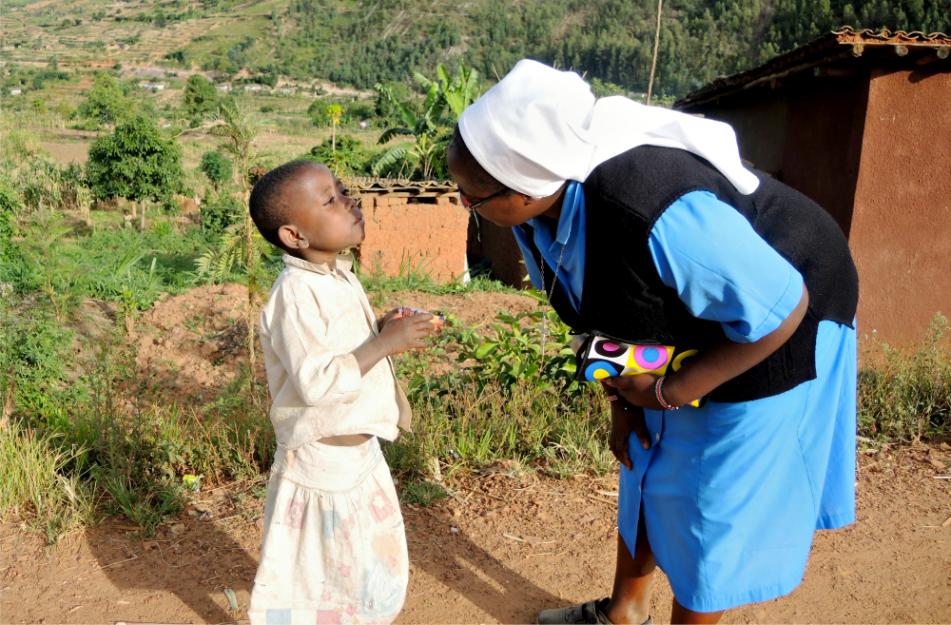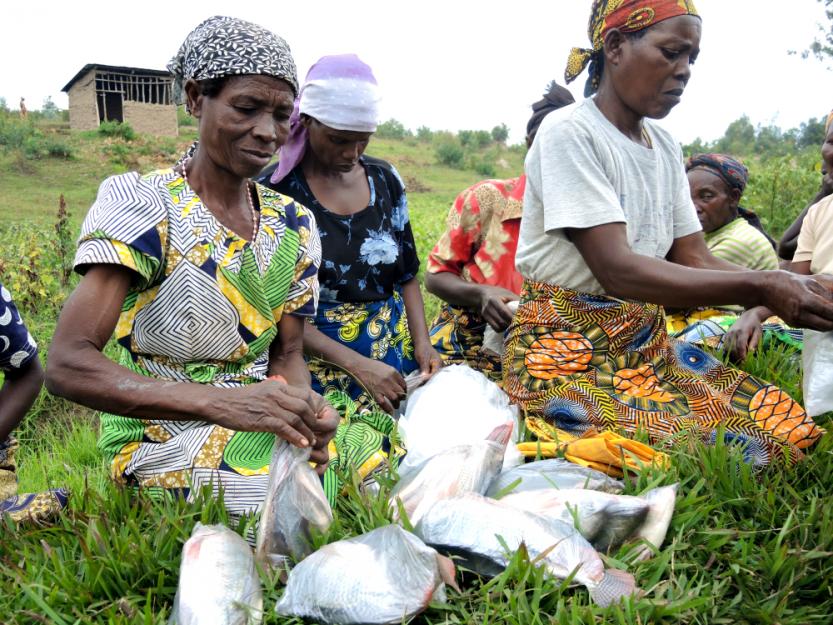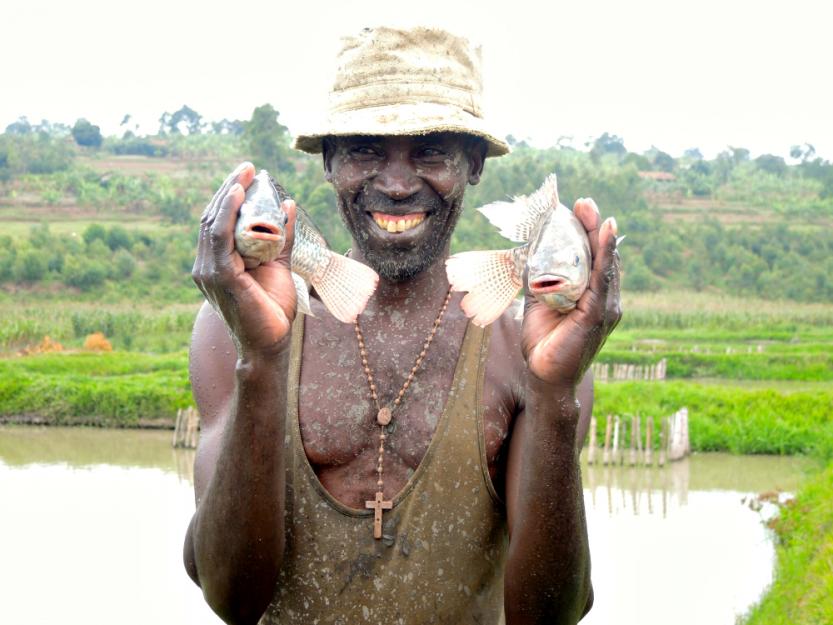Tracing Rwanda's highs and lows as it moves beyond history's shadow
 They call Rwanda "The Land of a Thousand Hills." Small mountains and knolls blanket this tiny country, from north to south and east to west. No matter where you stand, your feet are never on level ground — you are always either going up or going down.
They call Rwanda "The Land of a Thousand Hills." Small mountains and knolls blanket this tiny country, from north to south and east to west. No matter where you stand, your feet are never on level ground — you are always either going up or going down.
Those hills never felt more real as when I was clinging for dear life onto the back of a motorcycle taxi as I traveled to meet one sister or another, the government-mandated green helmet clanking on my head. With a driver going much too fast, we would climb up and up amid stunning vistas, hills rippling toward the horizon, or zoom down steep embankments where rice paddies squeezed into valleys or buildings rose from the capital of Kigali's pulsating downtown.
Rwanda, roughly the size of Vermont, is a land filled with highs and lows. Inescapable, of course, are the lows of almost 23 years ago, the genocide between the Hutu and Tutsi tribes that killed more than 800,000 people in 100 days. The genocide demolished 14 percent of Rwanda's population, and left the country completely in tatters.
Then, however, are the highs that came afterward: the way the country has built itself up, mud brick by mud brick, bean field by bean field, to a place where women make up 64 percent of the Parliament, ribbons of asphalt connect the country with smooth highways, and internet startup companies dot Kigali, birthing a strong middle class.
The sisters, too, are part of these highs and lows. The Catholic Church played a complicated role in the genocide. Sometimes priests and sisters rescued hundreds of people, protecting their own community members at severe risk to themselves. They stood strong as angry crowds outside their doors demanded blood.
Other times, church leaders aided the genocidaires (people who organized and carried out the genocide). Victims fled to churches for protection, but the clergy did not assist them or they even actively took part in the killing. Thousands of people were murdered in the pews of churches.
 Although many sisters were quietly doing heroic acts, protecting fellow sisters and their parishioners, others were not. The international courts indicted four priests and two sisters for war crimes in connection with the genocide. The two Benedictine sisters, Sr. Gertrude Mukangango and Sr. Maria Kisito Mukabutera, received 15 and 12 year sentences, respectively, for their role in handing over 7,000 Tutsis who were hiding at their convent in southern Rwanda.
Although many sisters were quietly doing heroic acts, protecting fellow sisters and their parishioners, others were not. The international courts indicted four priests and two sisters for war crimes in connection with the genocide. The two Benedictine sisters, Sr. Gertrude Mukangango and Sr. Maria Kisito Mukabutera, received 15 and 12 year sentences, respectively, for their role in handing over 7,000 Tutsis who were hiding at their convent in southern Rwanda.
It was only on Nov. 20, 2016, the last Sunday of the Year of Mercy, that the Catholic Church in Rwanda officially apologized for the church's role in the genocide. "Although the Church sent nobody to do harm, we, the Catholic clerics in particular, apologise, again, for some of the Church members, clerics, people who dedicated themselves to serve God and Christians in general who played a role in the 1994 Genocide against the Tutsi," the statement by the Conference of Catholic Bishops of Rwanda said.
However, government officials claimed that not all dioceses read the message, especially dioceses that are majority Hutu. The government also said the Church's statement appears "to take the extraordinary step of exonerating the Catholic Church as a whole for any culpability in connection with the Genocide," and expressed anger that the Vatican did not make any statements about the genocide.
Three months later, when Pope Francis met with Rwandan President Paul Kagame on March 20, Francis made an official apology.
Francis "conveyed his profound sadness, and that of the Holy See and of the church, for the genocide against the Tutsi," the Vatican said in a statement. "He expressed his solidarity with the victims and with those who continue to suffer the consequences of those tragic events."
The genocide and its aftermath are a silent undercurrent beneath many daily interactions in Rwanda. As part of the government's far-reaching control, it is illegal to talk about ethnicity in Rwanda. You will never hear "Hutu" or "Tutsi" in casual conversation. But it is impossible to escape.
"How many brothers or sisters do you have?" people often ask me in my travels, as a way of making conversation. "One younger brother, and how about you?" I always reply.
But in Rwanda, this question was met with an awkward pause. "We were eight, but two survived," one sister told me, which was the last time I asked that question.
But both the country and the women religious working there are choosing to focus on the realities and hopes of today rather than the massacres that haunt the past. Women religious are involved in many types of reconciliation work, including the internationally recognized Capacitar mindfulness training and "sister-listeners," a uniquely Rwandan solution pioneered by the oldest indigenous congregation, the Benebikira Sisters.
Sisters are combining psychological support with economic empowerment programs, finding ways for people from the Hutu and Tutsi tribes to work together to lift themselves out of poverty.
Rwanda has one of the fastest-growing economies in Africa, and is held up as the poster child of the region, a success story for the ages. World leaders, aid organizations and international nongovernmental organizations are often stunned by the speed with which Rwanda has picked itself up from the depths of depravity and surpassed its neighbors in terms of education, infrastructure and economic growth.
Everyone I talked to — sisters, activists, community leaders, farmers — spoke of the government's support for development. They always mentioned the efforts to streamline regulations for business licenses, meaning opening a business is a process of just a few hours. Many spoke of the almost total lack of corruption, which makes the country a favorite for international donors and organizations.
There are lows, of course, to the steady 8 percent average yearly growth in gross domestic product over the past 15 years. President Paul Kagame has been in power since 2000. In 2015, 98 percent of Rwandans voted in favor of a constitutional amendment that enables Kagame to stand for additional terms, possibly until 2034. The international community widely condemned the election, urging Kagame to develop "a new generation of leaders."
Though Kagame is well-respected and genuinely passionate about Rwanda's development, the country is still under a dictatorship. There is no press freedom and government supervision is constant and widespread, with all communications monitored.
Rwanda has wallowed in the lowest of the lows, but is now aiming for heights that other countries in the region can only dream about. Its commitment to countrywide high-speed fiber-optic internet cables or national health insurance for a $3.50 copay per year should make more developed countries blush. Almost 10 percent of the country's energy comes from solar, and streetlights run with energy-saving LEDs. Litter is nonexistent, plastic bags are illegal, and the streets are cleaner than any other city in the world.
Still, the country is having difficulty outrunning its shadow. Internationally, the first thing that comes to mind when hearing Rwanda is always "genocide."
"Genocide is something that we need to educate people about, but I don't think it should be a brand for a nation," said Honore Gatera, the director of the Kigali Genocide Memorial. "It's one part of the dark history that we've gone through, and this history of our country will never be erased," he said. "Even though we've gone through that history, we are resilient and we are sending a big message out there to humanity."
This message rings out loud and clear in a village called Gisagara, outside of the southern regional capital of Huye, where I met 58-year-old Jean Damascine Bizimana. He was working in the Dususuruke ("Warm Solidarity") fish farm, started by Sr. Mary Rose Mukakibogo of the Helpers of the Holy Souls. Bizimana was speckled with mud, after trying to catch the last few tilapia in one of the four fish ponds as the farm association drained the pool to fix some small leaks. He had been fish farming for six years, ever since he was released from prison, where he served time for committing genocide crimes.
"Can I take a picture of you?" I asked Bizimana.
"Wait! Wait!" cried Charlotte Nyiromasuhuko, also 58.
 Nyiromasuhuko was one of the original members the Dususuruke Association, and today is a central leader. She divvies up the jobs during the weekly fish harvest. Nyiromasuhuko lost her husband and most of her family in the genocide. She tossed Bizimana two fish. Both of them grinned as he mugged for the camera, a fish in each hand.
Nyiromasuhuko was one of the original members the Dususuruke Association, and today is a central leader. She divvies up the jobs during the weekly fish harvest. Nyiromasuhuko lost her husband and most of her family in the genocide. She tossed Bizimana two fish. Both of them grinned as he mugged for the camera, a fish in each hand.
Twenty-three years ago, Bizimana was part of the group that massacred Nyiromasuhuko's family. Now the two were playing catch with a pair of slippery tilapia and laughing together.
Nyiromasuhuko said it was difficult when the association, which started in 1997 for Tutsi genocide victims, began to accept Hutu members in 1998. Mukakibogo hoped to sow unity in the fractured village through a cooperative farm, to lift the residents out of poverty and depression.
"In the beginning, we were afraid of each other," said Nyiromasuhuko. "Once we started to talk, we were slowly, slowly gaining trust. The fear was moving out slowly until it was possible to be together."
In the Land of a Thousand Hills, the villagers from Gisagara found themselves in the deepest depths, their worlds shattered emotionally and physically after the genocide.
But every road that descends to the valley eventually begins to rise as it traces the contours of the land. Together, slowly, the residents of Gisagara and the country of Rwanda are climbing to new heights.
[Melanie Lidman is Middle East and Africa correspondent for Global Sisters Report based in Israel.]
